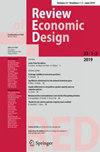Transfer of Authority within Hierarchy
IF 0.5
4区 经济学
Q4 ECONOMICS
引用次数: 0
Abstract
This paper studies delegation and communication in a model of three-tier hierarchy. There is an uninformed principal, and uninformed intermediary, and an informed agent. Under delegation the principal chooses an interval of actions to delegate to the intermediary, and the intermediary chooses a sub-interval from that interval to delegate to the agent. Under communication, the agent communicates with the intermediary, after which the intermediary communicates with the principal. We characterize the equilibrium outcomes under delegation and communication. We show that under delegation the principal can appoint a more biased individual to be the intermediary, and a less biased individual to be the agent. Furthermore, we demonstrate that the principal can prefer to communicate with the subordinates rather than delegate decision rights to them if the intermediary and the agent have opposing biased.层级内的权力转移
本文在一个三层结构的模型中研究委托与沟通。有一个不知情的委托人,一个不知情的中介,一个知情的代理人。在委托下,委托人选择一个区间的行为委托给中介,中介从该区间中选择一个子区间委托给代理。在沟通下,代理人与中介人沟通,之后中介人与委托人沟通。我们描述了授权和沟通下的均衡结果。我们证明,在委托下,委托人可以指定一个更有偏见的个人作为中介,而一个更少偏见的个人作为代理人。进一步,我们证明,如果中介和代理存在对立的偏见,委托人更愿意与下属进行沟通,而不是将决策权委托给下属。
本文章由计算机程序翻译,如有差异,请以英文原文为准。
求助全文
约1分钟内获得全文
求助全文
来源期刊

Review of Economic Design
ECONOMICS-
CiteScore
0.80
自引率
28.60%
发文量
37
期刊介绍:
Review of Economic Design comprises the creative art and science of inventing, analyzing and testing economic as well as social and political institutions and mechanisms aimed at achieving individual objectives and social goals. In this age of Economic Design, the accumulated traditions and wealth of knowledge in normative and positive economics and the strategic analysis of game theory are applied with novel ideas in the creative tasks of designing and assembling diverse legal-economic instruments. These include constitutions and other assignments of rights, mechanisms for allocation or regulation, tax and incentive schemes, contract forms, voting and other choice aggregation procedures, markets, auctions, organizational forms, such as partnerships, together with supporting membership and other property rights, and information systems. These designs, the methods of analysis used in their scrutiny, as well as the mathematical techniques and empirical knowledge they employ, along with comparative assessments of the performance of known economic systems and implemented designs, all of these form natural components of the subject matter of Economic Design.
Officially cited as: Rev Econ Design
 求助内容:
求助内容: 应助结果提醒方式:
应助结果提醒方式:


